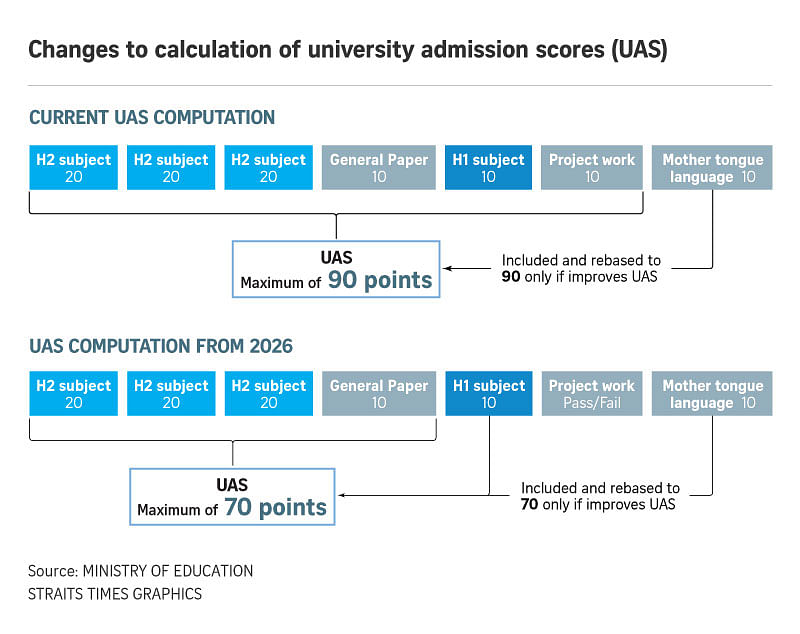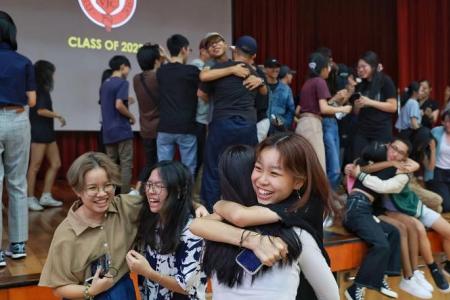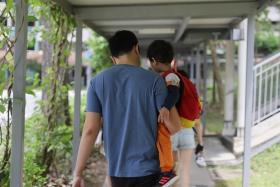Fourth content-based A-Level subject to be dropped from university admission score
Changes are underway to reduce the stakes of the A-level examinations and free up space for students to explore their interests, as well as to enable adults to pursue a degree at later parts in their lifelong learning journey.
From 2026, students from junior colleges (JCs) and Millennia Institute (MI) will not need to count their fourth content-based subject in their university admissions, unless it improves their score, said Education Minister Chan Chun Sing on Wednesday during the debate on his ministry’s budget.
Mid-year exams will also be gradually removed for JC and MI students from 2024, in line with the scrapping of such exams at the primary and secondary levels by 2023.
To give students more leeway to pursue issues of interest without worrying about results, the subject Project Work (PW) will be removed from the calculation of their university admission score, for the JC1 intake in 2024. They will be given a pass or fail, instead of letter grades.
Mr Chan announced these changes in Parliament, in response to Mr Baey Yam Keng (Tampines GRC) and Mr Darryl David (Ang Mo Kio GRC) who asked if MOE plans to review the A-level curriculum.
“Over the years, we have gradually reduced curricular content to free up more time and space for the development of 21st Century Competencies, or 21CC. Today, the curricular content of most of our A-Level syllabuses is already similar or narrower than the international syllabuses used as benchmarks for comparison,” said Mr Chan.
“It is not possible to reduce curricular content further without compromising the overall rigour,” he added.
Today, JC and MI students generally take four content-based subjects - typically three H2 and one H1 subject - along with General Paper (GP) and PW. They may also take Mother Tongue language.
Their performance across these subjects are considered for admission to the autonomous universities. MI offers a three-year route to the A levels instead of two years for JC students.
“Our students have done well in PW over the years. Making PW a pass/fail subject now encourages our students to exercise greater agency and creativity in areas of interests, rather than be driven by grades,” said Mr Chan, adding that a pass for the subject will be required to be eligible for admission to the autonomous universities.
These changes mean that the maximum university admission score would be 70, instead of the current 90.
Said Mr Chan: “The time saved from preparing for examinations can be channelled towards deeper student engagement and learning through more varied experiences. Teachers will continue to use assessments in a formative and calibrated way to monitor learning progress and support each student.”
The MOE said on Wednesday that as JCs remove their mid-year exams, this will not be replaced by more school-based assessments. They must also not administer more than one weighted assessment per subject per term.
In addition, GP will be made compulsory for all JC and MI students, starting with the 2024 intake. Knowledge and Inquiry (KI), which focuses more on philosophy, will continue to be offered but it can no longer replace GP, which places more emphasis on current affairs and contemporary issues.
About 100 students took KI in lieu of GP in the 2022 A-level exams.
More Singaporeans to get subsidised university places
More Singaporeans will get places in government-funded degree programmes, as MOE increases the lifetime cohort participation rate (CPR) in education.
Mr Chan said this figure - which covers both fresh school leavers and adult learners - will go up to 60 per cent by 2025, from the current 50 per cent.
The MOE said this means up to 2,300 more publicly-funded university places in 2025.
A ministry spokesman said that in the academic year 2022, the autonomous universities, Lasalle College of the Arts and Nanyang Academy of Fine Arts took in 22,400 students, including both fresh school leavers and adult learners.
Mr Chan said the increase in lifetime CPR was done in close consultation with the Ministry of Trade and Industry, the Ministry of Manpower and economic agencies. The increase in places will be weighted towards enabling adult learners from the workforce to access a university upgrading pathway.
“This takes into account the demand for degree-level manpower across the economy in the medium term, arising from our industry transformation efforts,” he said in response to MPs like Mr Patrick Tay (Pioneer) who spoke on the need to increase access to continuing education and training (CET) opportunities.
Adopting a ‘lifetime’ rate marks a shift from the prevailing practice of “frontloading” education and using the traditional CPR that refers to the proportion of students in a yearly cohort that progresses to university.
Said Mr Chan: “There is no need to rush to frontload education, as there will be more subsidised places for CET pathways to support upgrading later in life. It is also about ensuring that the format of these CET programmes is suited to the needs of working adults, and to the industries that they work in.”
To support this, the autonomous universities are relooking ways to better cater to adult learners, he added. These include micro-credentials that could be stacked up to a degree.
For example, mid-career workers looking to switch into the information and communications technology sector can pursue a degree in applied computing at the Singapore Institute of Technology while working. The programme is conducted via a mix of online and face-to-face lessons.

Individuals could also take up modular courses in job-related skills like computer networks and software engineering. These micro-credentials could be stacked up towards SIT’s applied computing degree.
The aim is not to perpetuate a paper chase, said Mr Chan. Continual learning must be about “purposeful and timely acquisition of relevant knowledge and skills’, he said, adding that qualifications then serve to reflect the mastery attained.
To this end, stackable pathways drawn up by the institutes of higher learning offer skills upgrading at different levels, he said. Annual enrolment into stackable courses has grown from about 31,000 in 2018 to about 36,000 in 2022.
Mr Chan said the MOE is also studying how to better support mid-career workers.
“In the past year, under the Forward Singapore exercise, we heard from Singaporeans on the barriers to reskilling or upskilling, particularly for those in their 40s and 50s,” he said.
“We are looking at ways to reduce the high opportunity costs of training for this group of workers, to enable them to participate in more substantive training for a skills reboot.”
The ministry is considering, for instance, providing more support through a SkillsFuture Credit top-up and training allowances for mid-career workers.
In the push for lifelong learning, shifting individual attitudes and raising the supply of training programmes will not be enough, though, if employers continue to fixate on credentials, said Mr Chan.
“We need employers to hire and compensate workers fairly based on their skills rather than paper qualifications, support workers in their upskilling, and provide opportunities for workers to apply new skills at work,” he said.
“This will ensure that after undergoing training, Singaporeans can get a real boost to their employability and wages, and enjoy access to better job opportunities.”
Get The New Paper on your phone with the free TNP app. Download from the Apple App Store or Google Play Store now


